All Within Is All We Know All You Know Verses All You Dont Your Primotdol Sound Echoing Out
Rainer Maria Rilke
The Duino Elegies
- Home
- Download
- Purchase This Book
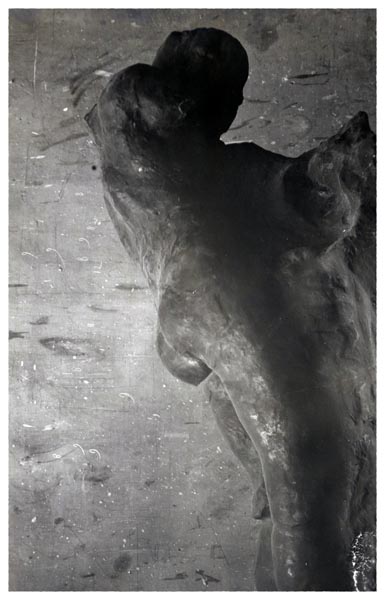
'The Earth' - Auguste Rodin (French, 1840 - 1917), The Getty Open Content Program
Read more Rilke, with a commentary on the Elegies entitled The Fountain of Joy.
Translated past A. Due south. Kline © Copyright, All Rights Reserved. Made available as an individual work in the United kingdom, 2004, via the Verse in Translation website. Published as part of the collection 'The Poesy of Rainer Maria Rilke', ISBN-ten: 1512129461, May 2015.
This work may exist freely reproduced, stored and transmitted, electronically or otherwise, for any not-commercial purpose. Atmospheric condition and Exceptions use.
Contents
- The First Elegy
- The 2d Elegy
- The Third Elegy
- The Fourth Elegy
- The Fifth Elegy
- The 6th Elegy
- The Seventh Elegy
- The Eighth Elegy
- The Ninth Elegy
- The Tenth Elegy
- Index past Beginning Line
- Notes
The First Elegy
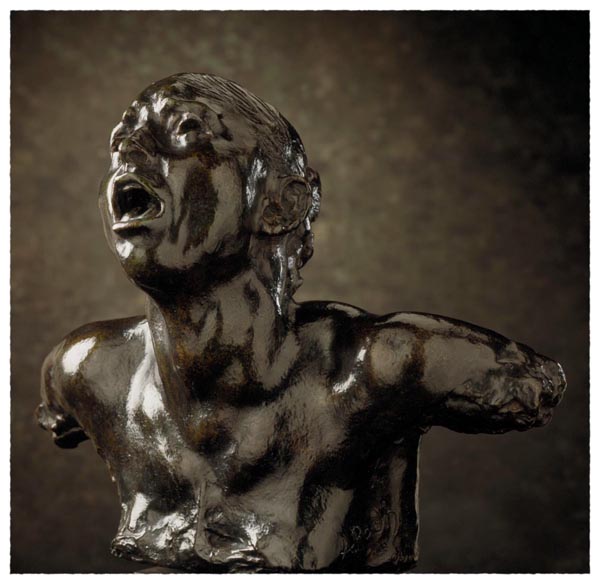
'The Cry' - Auguste Rodin (French, 1840 - 1917), The Los Angeles County Museum of Art
Who, if I cried out, would hear me among the Angelic
Orders? And fifty-fifty if 1 were to suddenly
take me to its middle, I would vanish into its
stronger beingness. For beauty is nothing but
the beginning of terror, that we are still able to bear,
and we revere it and so, because information technology calmly disdains
to destroy us. Every Angel is terror.
And so I hold myself back and swallow the cry
of a darkened sobbing. Ah, who then can
we make use of? Not Angels: not men,
and the resourceful creatures see clearly
that we are not really at domicile
in the interpreted world. Possibly at that place remains
some tree on a gradient, that we tin can see
once again each 24-hour interval: in that location remains to us yesterday's street,
and the thinned-out loyalty of a habit
that liked usa, then stayed, and never departed.
Oh, and the night, the night, when the wind full of space
wears out our faces – whom would she not stay for,
the longed-for, gentle, disappointing one, whom the alone center
with difficulty stands before. Is she less heavy for lovers?
Ah, they only hide their fate betwixt themselves.
Practise you lot not know yet? Throw the emptiness out of your artillery
to add to the spaces nosotros breathe; maybe the birds
volition feel the expansion of air, in more intimate flying.
Yeah, the Spring-times needed you deeply. Many a star
must take been there for you then you might feel it. A moving ridge
lifted towards you out of the by, or, as you walked
past an open window, a violin
gave of itself. All this was their mission.
But could you handle it? Were you lot non always,
still, distracted by expectation, every bit if all you experienced,
like a Love, came near to you? (Where could you comprise her,
with all the vast strange thoughts in you
going in and out, and often staying the night.)
Only if you lot are yearning, and so sing the lovers: for long
their notorious feelings have not been immortal enough.
Those, yous most envied them, the forsaken, that yous
found as loving equally those who were satisfied. Begin,
e'er as new, the unattainable praising:
think: the hero prolongs himself, even his falling
was only a pretext for being, his latest rebirth.
But lovers are taken back by exhausted Nature
into herself, equally if there were not the power
to make them again. Have you lot remembered
Gaspara Stampa sufficiently yet, that any girl,
whose lover has gone, might feel from that
intenser example of honey: 'Could I simply become like her?'
Should not these ancient sufferings be finally
fruitful for u.s.a.? Isn't it fourth dimension that, loving,
nosotros freed ourselves from the beloved, and, trembling, endured
equally the arrow endures the bow, so equally to be, in its flying,
something more itself? For staying is nowhere.
Voices, voices. Hear and so, my heart, as only
saints have heard: so that the mighty call
raised them from the earth: they, though, knelt on
impossibly and paid no attention:
such was their listening. Not that you could withstand
God'south voice: far from it. Just mind to the jiff,
the unbroken message that creates itself from the silence.
It rushes towards you now, from those youthfully dead.
Whenever you entered, didn't their fate speak to you lot,
quietly, in churches in Naples or Rome?
Or else an inscription exaltedly impressed itself on y'all,
every bit lately the tablet in Santa Maria Formosa.
What do they will of me? That I should gently remove
the semblance of injustice, that slightly, at times,
hinders their spirits from a pure moving-on.
It is truly foreign to no longer inhabit the world,
to no longer exercise customs barely caused,
not to give a meaning of man futurity
to roses, and other expressly promising things:
no longer to be what 1 was in endlessly anxious easily,
and to set up aside fifty-fifty one'south own
name similar a broken plaything.
Strange: not to become on wishing ane's wishes. Strange
to see all that was once in place, floating
and then loosely in space. And it's difficult being expressionless,
and full of retrieval, earlier one gradually feels
a trivial eternity. Though the living
all make the error of drawing also sharp a distinction.
Angels (they say) would often non know whether
they moved amid living or dead. The eternal current
sweeps all the ages, within information technology, through both the spheres,
forever, and resounds higher up them in both.
Finally they have no more demand of us, the early-departed,
weaned gently from earthly things, as ane outgrows
the mother's mild breast. Simply we, needing
such great secrets, for whom sadness is ofttimes
the source of a blessed progress, could we exist without them?
Is it a meaningless story how once, in the grieving for Linos,
first music ventured to penetrate arid rigidity,
so that, in startled space, which an most godlike youth
suddenly left forever, the emptiness starting time felt
the quivering that now enraptures us, and comforts, and helps.
The Second Elegy
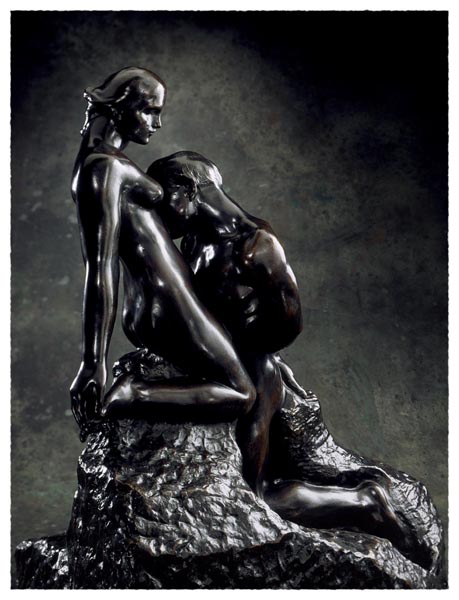
'Eternal Idol' - Auguste Rodin (French, 1840 - 1917), The Los Angeles County Museum of Fine art
Every Angel is terror. And yet,
ah, knowing you, I invoke you, almost deadly
birds of the soul. Where are the days of Tobias,
when one of the well-nigh radiant of yous stood at the simple threshold,
disguised somewhat for the journeying and already no longer awesome
(Similar a youth, to the youth looking out curiously).
Allow the Archangel now, the dangerous one, from behind the stars,
take a single pace down and toward u.s.: our own eye,
beating on high would crush us downwardly. What are you?
Early successes, Cosmos's favourite ones,
mount-chains, ridges reddened by dawns
of all origin – pollen of flowering godhead,
junctions of calorie-free, corridors, stairs, thrones,
spaces of being, shields of bliss, tempests
of storm-filled, delighted feeling and, of a sudden, solitary
mirrors: gathering their own out-streamed beauty
back into their faces again.
For nosotros, when we experience, evaporate: oh, we
exhale ourselves out and away: from ember to ember,
yielding us fainter fragrance. Then someone may say to united states:
'Yes, yous are in my blood, the room, the Spring-fourth dimension
is filling with you lot'..... What use is that: they cannot concur united states of america,
we vanish within and around them. And those who are beautiful,
oh, who holds them back? Appearance, incessantly, stands up,
in their face, and goes past. Like dew from the morning grass,
what is ours rises from us, similar the heat
from a dish that is warmed. O grin: where? O upward gaze:
new, warm, vanishing wave of the heart - :
oh, we are that. Does the cosmic space,
we dissolve into, taste of usa then? Do the Angels
actually only take back what is theirs, what has streamed out of them,
or is there sometimes, as if by an oversight, something
of our beingness, likewise? Are we as mingled with their
features, as in that location is vagueness in the faces
of pregnant women? They practice not encounter it in the swirling
return to themselves. (How should they see it?)
Lovers, if they knew how, might utter
strange things in nighttime air. Since it seems
everything hides us. Wait, trees exist; houses,
we alive in, still stand. But nosotros
pass everything by, like an exchange of air.
And all is at 1, in keeping the states undercover, one-half out of
shame perhaps, half out of inexpressible hope.
Lovers, each satisfied in the other, I enquire
you virtually the states. Y'all grasp yourselves. Take you a sign?
Wait, it happens to me, that at times my hands
get enlightened of each other, or that my worn face
hides itself in them. That gives me a slight
sensation. Simply who would dare to exist only for that?
You, though, who grow in the other'southward please
until, overwhelmed, they beg:
'No more' -: you, who nether your easily
grow richer like vintage years of the vine:
who sometimes vanish, considering the other
has so gained the ascendancy: I ask you of the states. I know
you touch and so blissfully because the cuddle withholds,
considering the identify you lot embrace and so tenderly
does not disappear: because below it yous experience
pure elapsing. And so that you promise eternity
almost, from the embrace. And withal, when you lot've endured
the first terrible glances, and the yearning at windows,
and the first walk together, only once, through the garden:
Lovers, are y'all the same? When you enhance yourselves
one to another's oral fissure, and hang there – sip against sip:
O, how strangely the drinker then escapes from their action.
Weren't yous amazed by the circumspection of human gesture
on Attic steles? Weren't love and departure
laid and so lightly on shoulders, they seemed to be made
of other matter than ours? Recall of the hands
how they residue without weight, though there is power in the torso.
Those self-controlled ones know, through that: so much is ours,
this is united states of america, to touch on our own selves so: the gods
may bear down more heavily on united states. But that is the gods' thing.
If only we too could observe a pure, contained
human place, a strip of fruitful land of our own,
between river and rock! For our own middle exceeds us,
even as theirs did. And we tin no longer
gaze subsequently information technology into images, that soothe it, or into
godlike bodies, where it restrains itself more completely.
The Third Elegy
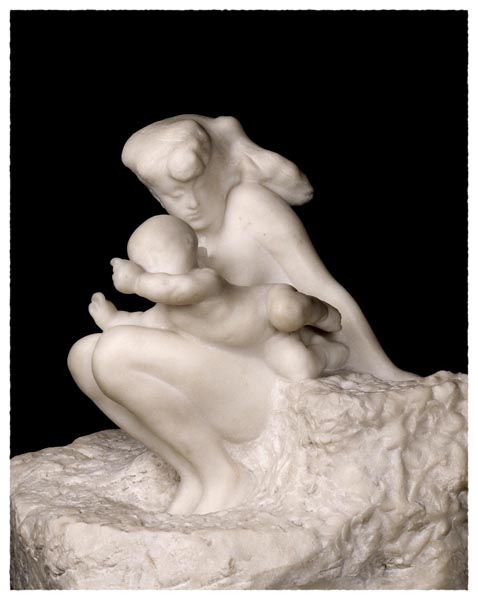
'Adult female and Child' - Auguste Rodin (French, 1840 - 1917), The National Gallery of Art
To sing the beloved is 1 thing, some other, oh,
that hidden guilty river-god of the blood.
What does he know, himself, of that lord of desire, her young lover,
whom she knows distantly, who oftentimes out of his solitariness,
before the girl soothed him, oft, as if she did not exist,
held upwardly, dripping, from what unknowable depths,
his godhead, oh, rousing the nighttime to countless uproar?
O Neptune of the blood, O his trident of terrors.
O the nighttime storm-wind from his breast, out of the twisted conch.
Hear, how the night becomes thinned-out and hollow. Y'all, stars,
is information technology not from you that the lover'south joy in the beloved'southward
face rises? Does he not gain his innermost insight,
into her face's purity, from the pure stars?
It was not you lot, alas, not his female parent
that bent the arc of his brow into such expectation.
Not for you, girl, feeling his presence, not for yous,
did his lips curve into a more fruitful expression.
Practice you truly call up that your light entrance
rocked him so, yous who wander like winds at dawn?
You terrified his eye, that'due south so: but more ancient terrors
plunged into him with the impetus of touching.
Call him...you tin can't quite call him away from that dark companion.
Of course he wants to, and does, escape: relieved, winning
his manner into your undercover middle, and takes on, and begins himself.
Did he ever brainstorm himself, though?
Mother you lot made his littleness: yous were the i who began him:
to y'all he was new, yous hung the friendly world
over new eyes, and defended him from what was strange.
Oh where are the years when y'all simply repelled
the surging void for him, with your slight form?
You hid then much from him then: you fabricated the doubtable room
harmless at night, from your heart filled with refuge
mixed a more human being infinite with his spaces of night.
Not in the darkness, no, in your nearer beingness
you placed the low-cal, and information technology shone equally if out of friendship.
There wasn't a single creaking you couldn't explicate with a smile,
every bit if you had long known when the flooring would practise so....
And he heard you and was soothed. Your being
was so tenderly potent: his fate there stepped,
tall and cloaked, backside the wardrobe, and his restless future,
and so easily delayed, fitted the folds of the curtain.
And he himself, every bit he lay at that place, relieved,
dissolving a sweetness, of your gentle creation,
under his sleepy eyelids, into the sleep he had tasted - :
seemed protected.....But inside: who could hinder,
forestall, the cardinal inundation inside him?
Ah, there was little caution in the sleeper: sleeping,
but dreaming, simply fevered: what began there!
How, new, fearful, he was tangled
in ever-spreading tendrils of inner result:
already twisted in patterns, in strangling growths,
amongst prowling bestial forms. How he gave himself to it -. Loved.
Loved his inward earth, his inner wilderness,
that first world within, on whose mute overthrow
his heart stood, newly green. Loved. Relinquished information technology, went on,
through his own roots, to the vast fountain
where his little birth was already outlived. Lovingly
went down into more ancient bloodstreams, into ravines
where Horror lay, still gorged on his forefathers. And every
Terror knew him, winked, like an informant.
Yeah, Dread smiled.........Seldom
take yous smiled so tenderly, mothers. How could he
help loving what smiled at him. Before you
he loved it, since, while you lot carried him,
it was dissolved in the waters, that render the embryo light.
Meet, we don't love like flowers, in a
single twelvemonth: when we dearest, an ancient
sap rises in our arms. O, girls,
this: that nosotros loved inside u.s., not one to come, just
the immeasurable seething: not a single child,
but the fathers: resting on our depths
similar the rubble of mountains: the dry river-beds
of those who were mothers - : the whole
silent landscape under a overcast or
articulate destiny - : girls, this came before you lot.
And you yourself, how could you lot know – that yous
stirred upwards primordial time in your lover. What feelings
welled upwardly from lost lives. What
women hated y'all there. What sinister men
you roused upwardly in his young veins. Dead
children wanted you.....O, gently, gently,
show him with love a confident daily task - lead him
about to the Garden, requite him what outweighs
those nights........
Be in him...............
The 4th Elegy
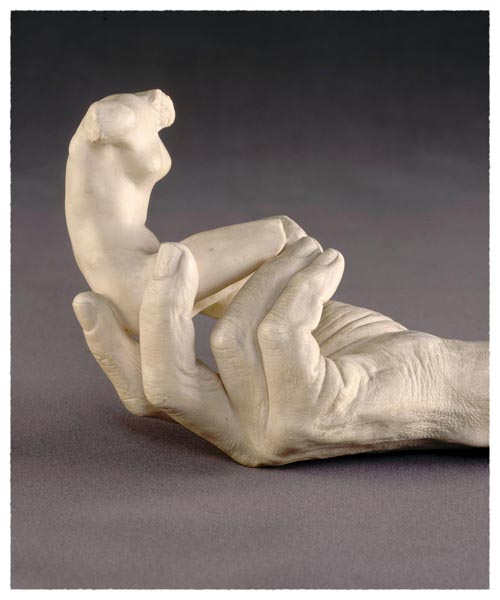
'Hand of Rodin with a Female Figure' - Auguste Rodin (French, 1840 - 1917), The National Gallery of Art
O trees of life, O when are you wintering?
We are not unified. We accept no instincts
like those of migratory birds. Useless, and tardily,
we force ourselves, suddenly, onto the wind,
and fall down to an indifferent lake.
We realise flowering and fading together.
And somewhere lions still roam. Never knowing,
as long as they have their splendour, of any weakness.
We, though, while we are intent on 1 thing, wholly,
experience the loss of some other. Enmity
is our neighbour. Aren't lovers
always arriving at boundaries, each of the other,
who promised altitude, hunting, and home?
And when, for the sketch of a moment,
a contrasting background is carefully prepared
then that nosotros can see it: then this is clear
to us. We do not know the contours
of feeling, only what forms it from outside.
Who has non sat, scared, earlier his heart's curtain?
It drew itself upward: the scenery was of Departure.
Piece of cake to cover. The familiar garden
swaying a trivial: then the dancer appeared.
Non him. Plenty! However lightly he moves
he is in costume, and turns into a citizen,
and goes through the kitchen into his firm.
I don't want these half-completed masks,
rather the Doll. That is consummate. I volition
endure its beat out, its wire, its face
of mere appearance. Here. I am waiting.
Fifty-fifty if the lights become out, even if someone
says to me: 'No more' - , even if emptiness
reaches me as a grayness draught of air from the stage,
fifty-fifty if none of my silent forefathers
sits by me any more than, not one woman,
non even the boy with the chocolate-brown, squinting, optics.
I'll still be hither. One tin always sentinel.
Am I not right? You, to whom life tasted
so bitter, father, tasting mine,
that offset clouded infusion of my necessities,
you kept on tasting, as I grew,
and preoccupied by the after-gustation
of such a strange future, searched my misted gaze –
y'all, my father, who since you were dead, take ofttimes
been anxious within my innermost hopes,
and giving up calm, the kingdoms of calm
the expressionless ain, for my flake of fate,
am I not right? And you women, am I not right,
who would love me for that modest kickoff
of love, for yous, that I always turned away from,
because the space of your faces changed,
as I loved, into cosmic infinite,
where you no longer existed......When I feel
like waiting in front end of the puppet theatre, no,
rather gazing at it, so intently, that at terminal,
to rest my gaze, an Angel must come up
and have part, dragging the puppets on loftier.
Angel and Doll: so there's a play at terminal.
And so what we endlessly separate,
only by being, comes together. Then at last
from our seasons here, the orbit
of all change emerges. Over and to a higher place us,
and then, the Angel plays. See the dying
must realise that what we do here
is nothing, how full of pretext it all is,
null in itself. O hours of childhood,
when, behind the images, there was more
than the past, and in forepart of u.s. was not the future.
We were growing, information technology's truthful, and sometimes urged that
we soon grew upwards, half for the sake
of those others who had nothing but their grown-upward-ness.
And were, yet, on our ain, happy
with Timelessness, and stood there,
in the space betwixt world and plaything,
at a betoken that from first ancestry
had been marked out for pure event.
Who shows a child, just as they are? Who sets it
in its constellation, and gives the mensurate
of distance into its hand? Who makes a child'due south death
out of grey bread, that hardens, - or leaves it
inside its circular mouth like the core
of a shining apple tree? Killers are
easy to grasp. But this: death,
the whole of death, before life,
to concur information technology and so softly, and not live in acrimony,
cannot be expressed.
The Fifth Elegy
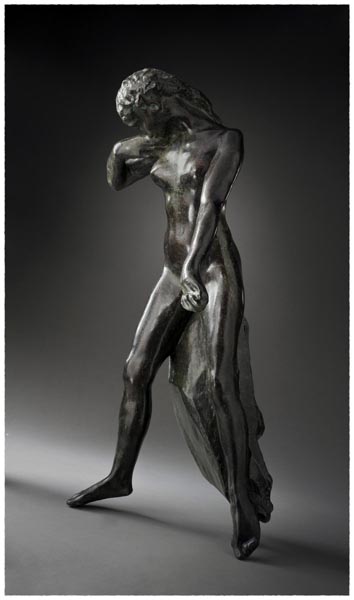
'Standing Female Faun' - Auguste Rodin (French, 1840 - 1917), The Los Angeles County Museum of Art
Simply who are they, tell me, these Travellers, fifty-fifty more
transient than nosotros are ourselves, urgently, from their earliest days,
wrung out for whom – to please whom,
by a never-satisfied volition? Yet it wrings them,
bends them, twists them, and swings them,
throws them, and catches them again: as if from oiled
more slippery air, so they land
on the threadbare carpet, worn by their continual
leaping, this carpeting
lost in the universe.
Stuck on like a plaster, equally if the suburban
sky had wounded the earth at that place.
And scarcely there,
upright, in that location and revealed: the keen
capital letter of Beingness.........and already the ever-returning
grasp wrings the strongest of men once more, in jest,
as King August the Strong would crush
a can plate.
Ah, and effectually this
centre, the rose of watching
flowers and un-flowers. Round this
postage, this pistil, defenseless in the pollen
of its own flowering, fertilised
again to a shadow-fruit of disinterest,
their never-conscious, seeming-to-smiling, disinterest,
gleaming lightly, on surface thinness.
There, the withered, wrinkled lifter,
an one-time homo, only a drummer now,
shrunk in his massive hide, every bit though it had once
contained ii men, and one was already
lying there in the churchyard, and the other had survived him,
deaf, and sometimes a little
dislocated in his widowed skin.
And the young one, the man, as if he were son of a neck
and a nun: taut and erectly filled
with muscle and simple-mindedness.
O you,
that a sorrow, that was still small,
one time received as a plaything, in one of its
long convalescences......
You, who fall, with the thud
that simply fruit knows, unripe,
a hundred times a day from the tree of mutually
built-upwards move (that, swifter than water,
in a few moments, shows spring, summer and fall),
autumn, and affect on the grave:
sometimes, in half-pauses, a loving look tries
to ascent from your face towards your seldom
affectionate mother: but it loses itself in your body,
whose surface consumes the shy
scarcely-attempted await.....And again
the man is clapping his easily for your leap, and before
a pain tin become more singled-out, close to your
constantly racing heart, a burning grows in the soles of your feet,
its source, earlier a few quick tears rush actual into your eyes.
And yet, blindly,
that smile........
Angel! O, gather it, pluck it, that pocket-size-flowered healing herb.
Make a vase, keep it safety! Place it amongst those joys non however
open to usa: on a lovely urn,
praise information technology, with flowery, swirling, inscription:
'Subrisio Saltat: the Saltimbanque'southward smile'
You, and then, love,
you, that the loveliest delights
silently over-leapt. Perchance
your frills are happy for you –
or the light-green metal silk,
over your business firm young breasts,
feels itself endlessly pampered, and needing nothing.
Yous, market fruit of serenity
laid out, incessantly, on all the quivering residuum scales,
publicly, beneath the shoulders.
Where, oh where is the place – I acquit it in my eye –
where they were still far from capable, still fell away
from each other, like coupling animals, not yet
ready for pairing: -
where the weights are still heavy:
where the plates still topple
from their vainly twirling
sticks.......
And, suddenly, in this troublesome nowhere, suddenly,
the unsayable indicate where the pure too-footling
is inverse incomprehensibly -, altered
into that empty as well-much.
Where the many-placed calculation
is exactly resolved.
Squares: O square in Paris, countless show-place,
where the milliner, Madame Lamort,
winds and twists the restless trails of the earth,
endless ribbons, into new
bows, frills, flowers, rosettes, artificial fruits – all
falsely coloured, - for winter'southward
cheap hats of destiny.
Angel: if in that location were a place we know nothing of, and there,
on some unsayable carpet, lovers revealed
what here they could never master, their loftier daring
figures of middle'southward flying,
their towers of desire, their ladders,
long since continuing where there was no footing, leaning,
trembling, on each other – and mastered them,
in front of the circumvolve of watchers, the countless, soundless expressionless:
Would these not fling their last, ever-saved,
ever-hidden, unknown to the states, eternally
valid coins of happiness in front of the finally
truly smiling pair on the silent
carpet?
The Sixth Elegy
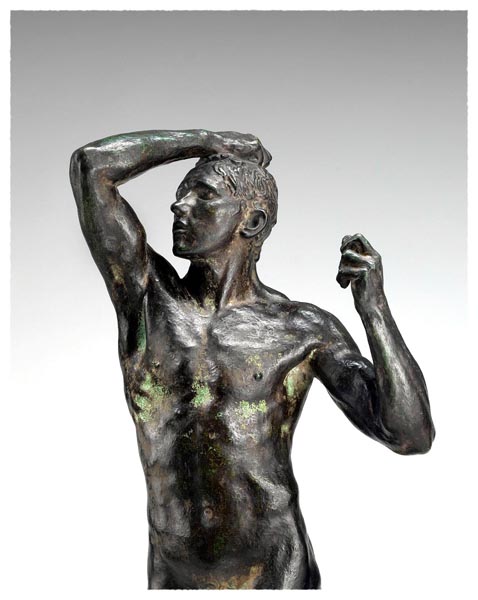
'The Age of Statuary' - Auguste Rodin (French, 1840 - 1917), The National Gallery of Art
Fig-tree, for such a long time now, there has been meaning for me,
in the mode you lot well-nigh wholly omit to blossom
and urge your pure secret, unheralded,
into the early on, resolute fruit.
Like the jet of a fountain, your biconvex bender
drives the sap downward, then upwards: and it leaps from its sleep
barely waking, into the bliss of its sweetest accomplishment.
See: like the god into the swan
..........Nosotros, though, linger,
ah, our pride is in flowering, and, already betrayed,
we accomplish the late core of our final fruit.
In a few the urge to action rises and so powerfully,
that they are already waiting and glowing with their centre'southward fullness
when the temptation to blossom, like the balmy dark air,
touches their tender mouths, touches their eyelids:
heroes perhaps, and those chosen to vanish prematurely,
in whom Expiry the gardener wove unlike veins.
These plunge ahead: they become before their ain smile,
like the squad of horses in the slightly
hollowed-out relief of Karnak's victorious pharaoh.
The hero is strangely close to those who died immature. Lasting
doesn't contain him. Being is his ascent: he moves on,
time and again, to enter the changed constellation
his take chances entails. Few could find him there. Simply
Destiny, that darkly hides us, of a sudden inspired,
sings him into the tempest of his onrushing earth.
I hear no one like him. All at once I am pierced
past his darkened sound carried on streaming air.
So, how gladly I would hide from the yearning: O if I,
if I were a boy, and might come to it still, and sit,
propped on the future's arms, and reading near Samson,
how his mother first bore nothing, and then all.
Was he not a hero already, O mother, in yous, did not
his imperious selection begin inside you?
Thousands seethed in the womb and willed to be him,
but meet: he grasped and allow become, chose and achieved.
And if he shattered pillars, information technology was when he burst
out of the world of your flesh into the narrower earth,
where he went on choosing, achieving. O mothers of heroes,
O sources of ravening rivers! Ravines into which
weeping girls have plunged
from the high middle's edge, future offerings to the son.
Because, whenever the hero stormed through the stations of love,
each heartbeat, meant for him, lifting him onward,
he turned away, stood at the stop of the smiles, someone other.
The 7th Elegy
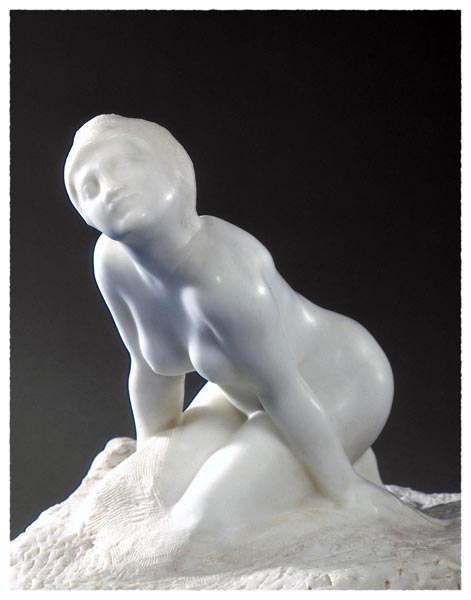
'Figure of a Woman "The Sphinx"' - Auguste Rodin (French, 1840 - 1917), The National Gallery of Fine art
Wooing, no longer: wooing will not exist the form of your
cry, voice that'due south outgrown it: true, you lot would cry pure as a bird,
when the flavor lifts him, the ascending i, almost forgetting
that he is a suffering animate being, and non just a solitary center
that information technology flings into brightness, to intimate heavens. Similar him,
you also, would be wooing no less – so that, still invisible,
some girl would sense y'all, the silent i, in whom a answer
slowly wakes and grows warm, as she listens –
the glowing feeling mated to your daring feeling.
Oh and the Spring-time would comprehend – there is no place
that would not echo its voice of proclamation.
First the tiny questioning piping, that a purely affirmative twenty-four hours
surrounds more deeply with heightened stillness.
Then upwards the stairway, the stairway of calling, up to
the dreamed-of temple of future - : so the trill, fountain
that in its rising jet already anticipates falling,
in promise's play.......And the summer to come.
Not just the devotion of these unfolded forces,
not only the paths, not only the evening fields,
not just, after a late storm, the breathing freshness,
not only approaching sleep and a premonition, evenings...
as well the nights! Also the high summer nights,
also the stars, the stars of this Earth!
O to be dead at last and know them eternally,
all the stars: for how, how, how to forget them!
Come across, I was calling my lover. But not only she
would come......Girls would come from delicate graves
and gather.....for, how could I limit
the call, one time called? The cached ever
all the same seek the Globe. – You, children, a single
thing grasped hither is many times valid.
Don't remember that Fate is more than a childhood across:
how often y'all overtook the beloved, panting,
panting after the beatific hunt after cipher, into what's costless.
Being here is the wonder. Yous knew it, girls, even you,
you who seemed dispensable, sunken – you, in the worst
streets of the cities, festering, or open
for refuse. Since an hour was given – perchance not
so much as an hour, one that was scarcely
measurable past time's measure out, between two moments, where you
had a existence. Everything. Veins filled with existence.
Merely we forget and so easily what our laughing neighbour
neither acknowledges nor envies. Nosotros want to visibly
show it, while even the most visible of joys
can only brandish itself to us when we accept changed it, from within.
Nowhere, beloved, will earth be, but within. Our
life passes in change. And ever-shrinking
the outer diminishes. Where at that place was once a permanent house,
some conceptual structure springs up, athwart us, equally fully
at domicile amid concepts, as if information technology still stood in the brain.
Vast reservoirs of ability are created by the spirit of the age,
formless, like the tense yearning gained from all things.
Temples are no longer known. Those extravagances
of the heart nosotros keep, more secretly. Aye, where even one survives,
a single thing one time prayed to, served, knelt before –
it stands, as it is, already there in the invisible.
Many no longer run across information technology, merely lose the take a chance to build information technology
inside themselves now, with columns, and statues, grander!
Each vague turn of the world has such disinherited ones,
to whom the former does not, and the next does not even so, belong.
Since even the next is far from flesh. Though
this should not confuse u.s., merely strengthen in usa the keeping
of nonetheless recognisable forms. This once stood amidst men,
stood in the midst of fate, the destroyer, stood
in the midst of non-knowing-towards-what, as if information technology existed, and drew
stars towards itself out of the enshrined heavens. Affections,
I'll show it to you, too, in that location! Information technology volition stand
in your gaze, finally upright, saved at terminal.
Columns, pylons, the Sphinx, the stirring thrust
of the cathedral, grey, out of a fading or conflicting urban center.
Was it not miracle? O, exist astonished, Affections, since we are this,
O tell them, O groovy one, that we could accomplish this: my breath
is also slight for this praising. And so, after all, we accept non
failed to make employ of these spaces, these generous ones,
our spaces. (How frighteningly vast they must be,
when they are not overfull of our feelings, after thousands of years.)
But a tower was cracking, was it non? O Affections, it was though –
even compared to you? Chartres was neat – and Music
towered still higher and went beyond the states. Why even
a girl in love, oh, alone in the night, at her window,
did she not achieve to your knees? –
Don't call back that I'thou wooing.
Angel, were I doing then, you would not come! Since my telephone call
is always total of outpouring: against such a powerful
current you cannot accelerate. Like an outstretched
arm, my telephone call. And its mitt, opened above
for grasping, remains open, before y'all,
every bit if for defence and for warning,
wide open, Incomprehensible One.
The Eighth Elegy
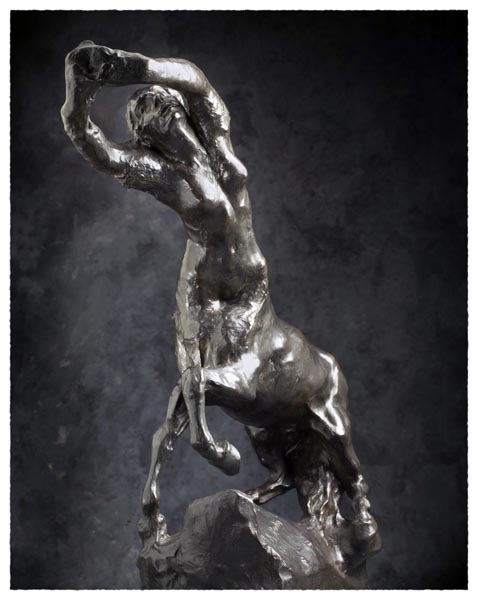
'Female Centaur' - Auguste Rodin (French, 1840 - 1917), The Los Angeles County Museum of Art
The creature gazes into openness with all
its eyes. But our eyes are
equally if they were reversed, and surround it,
everywhere, similar barriers against its free passage.
We know what is exterior u.s. from the animal's
face alone: since we already turn
the young child round and brand information technology expect
backwards at what is settled, not that openness
that is and so deep in the fauna's vision. Free from death.
We alone see that: the free beast
has its progress always behind it,
and God before it, and when it moves, it moves
in eternity, as streams do.
We never take pure space in front end of united states,
non for a unmarried day, such as flowers open up
endlessly into. Always in that location is world,
and never the Nowhere without the Non: the pure,
unwatched-over, that ane breathes and
endlessly knows, without craving. As a child
loses itself sometimes, i with the stillness, and
is jolted back. Or someone dies and is it.
Since most to decease 1 no longer sees death,
and stares ahead, perhaps with the large gaze of the animal.
Lovers are shut to information technology, in wonder, if
the other were not always in that location closing off the view.....
As if through an oversight it opens out
backside the other......But there is no
way past information technology, and it turns to world again.
Ever turned towards creation, we run across
just a mirroring of freedom
dimmed past united states of america. Or that an animate being
mutely, calmly is looking through and through united states.
This is what fate ways: to be opposite,
and to be that and nothing else, opposite, forever.
If at that place was consciousness similar ours
in the certain brute, that moves towards us
on a unlike track – it would drag us
circular in its wake. But its own being
is boundless, unfathomable, and without a view
of its condition, pure as its outward gaze.
And where nosotros meet time to come it sees everything,
and itself in everything, and is healed for always.
And yet in the warm waking animal
is the care and burden of a great sadness.
Since it too always has within it what oft
overwhelms us – a memory,
as if what one is pursuing now was in one case
nearer, truer, and joined to united states
with space tenderness. Here all is distance,
there it was jiff. Compared to that first abode
the second 1 seems ambiguous and uncertain.
O elation of trivial creatures
that stay in the womb that carried them forever:
O joy of the midge that can notwithstanding leap within,
even when it is wed: since womb is all.
And encounter the half-assurance of the bird,
almost aware of both from its inception,
every bit if it were the soul of an Etruscan,
born of a dead man in a space
with his reclining effigy as the chapeau.
And how dismayed anything is that has to fly,
and leave the womb. As if it were
terrified of itself, zig-zagging through the air, equally a crevice
runs through a cup. As the track
of a bat rends the porcelain of evening.
And we: onlookers, e'er, everywhere,
always looking into, never out of, everything.
Information technology fills us. We arrange information technology. It collapses.
We arrange it again, and collapse ourselves.
Who has turned us circular like this, and so that,
whatever nosotros do, we always take the aspect
of one who leaves? Just as they
will turn, stop, linger, for one last time,
on the last colina, that shows them all their valley - ,
then we live, and are e'er taking leave.
The 9th Elegy
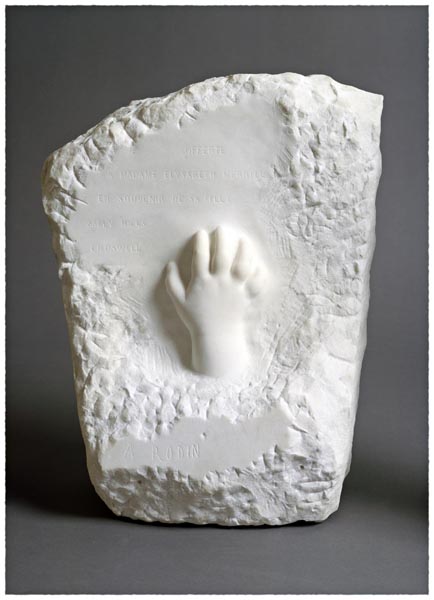
'Memorial Relief (Hand of a Child)' - Auguste Rodin (French, 1840 - 1917), The Los Angeles County Museum of Art
Why, if it could begin as laurel, and be spent so,
this space of Existence, a little darker than all
the surrounding light-green, with little waves at the edge
of every leaf (like a breeze's smiling) - : why then
have to be human – and shunning destiny
long for destiny?....
Oh, not because happiness exists,
that over-hasty profit from imminent loss,
non out of curiosity, or to practise the heart,
which could exist in the laurel......
Only because being here is much, and because all
that's here seems to demand us, the ephemeral, that
strangely concerns u.s.. We: the well-nigh ephemeral. Once,
for each thing, merely in one case. One time, and no more. And nosotros likewise,
once. Never again. But this
one time, to take been, though only once,
to have been an earthly thing – seems irrevocable.
And so we go on pushing on, and trying to achieve it,
trying to contain information technology in our simple hands,
in the inundation gaze and the speechless heart.
Trying to become it. Whom to requite it to? We would
hold on to it for always....Ah, what, alas, practise we
take into that other dimension? Not the gazing which we
slowly learned here, and null that happened. Naught.
Suffering then. Above all, then, the difficulty,
the long experience of love, then – what is
wholly unsayable. But later,
among the stars, what use is it: it is better unsayable.
Since the traveller does not bring a handful of earth
from mountain-gradient to valley, unsayable to others, but only
a word that was won, pure, a yellow and blue
gentian. Are nosotros here, perchance, for saying: house,
bridge, fountain, gate, jug, fruit-tree, window –
at most: cavalcade, tower......simply for maxim, realise,
oh, for a saying such as the things themselves would never
have profoundly said. Is non the secret intent
of this discreet Globe to describe lovers on,
so that each and every thing is delight within their feeling?
Threshold: what is it for ii
lovers to exist wearing their own threshold of the aboriginal door
a little, they besides, afterward the many before them,
and before those to come......., simple.
Here is the age of the sayable: here is its domicile.
Speak, and exist witness. More than than ever
the things of experience are falling away, since
what ousts and replaces them is an deed with no epitome.
An act, under a chaff that volition split, every bit soon every bit
the business inside outgrows it, and limit itself differently.
Between the hammers, our middle
lives on, equally the tongue
between the teeth, that
in spite of them, keeps praising.
Praise the world to the Angel, not the unsayable: yous
can't impress him with glories of feeling: in the universe,
where he feels more deeply, yous are a novice. So show
him a simple affair, fashioned in age after age,
that lives close to manus and in sight.
Tell him things. He'll exist more amazed: as y'all were,
beside the rope-maker in Rome, or the potter beside the Nile.
Show him how happy things can exist, how guiltless and ours,
how even the cry of grief decides on pure form,
serves equally a thing, or dies into a affair: transient,
they await to us for deliverance, nosotros, the most transient of all.
Will united states of america to change them completely, in our invisible hearts,
into – oh, endlessly, into us! Whoever, in the end, we are.
Earth, is it not this that you want: to rising
invisibly in u.s.? – Is that non your dream,
to be invisible, ane day? – Earth! Invisible!
What is your urgent command if non transformation?
Earth, dearest, I will. O, believe me, you need
no more Spring-times to win me: only one,
ah, one, is already more than my blood can stand.
Namelessly, I have been truly yours, from the showtime.
You lot were always right, and your most sacred inspiration
is that familiar Death.
See I live. On what? Neither childhood nor time to come
grows less......Backlog of existence
wells up in my center.
The Tenth Elegy
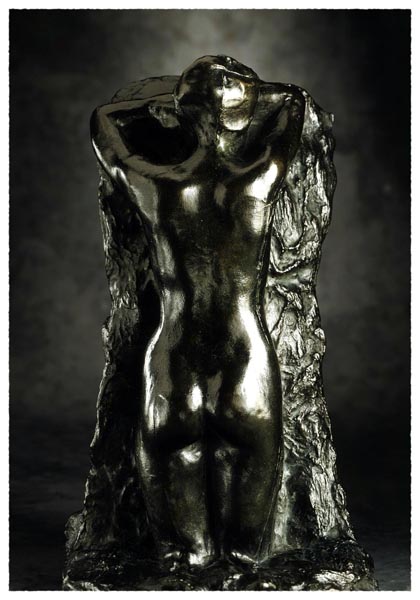
'La Douleur (de La Porte)' - Auguste Rodin (French, 1840 - 1917), The National Gallery of Art
Some day, in the emergence from this trigger-happy insight,
let me sing jubilation and praise to assenting Angels.
Let not a single ane of the cleanly-struck hammers of my centre
deny me, through a slack, or a doubtful, or
a broken string. Let my streaming face up
make me more radiant: let my secret weeping
behave flower. O, how dear you volition exist to me, and then, Nights
of anguish. Inconsolable sisters, why did I non
kneel more than to greet you lot, lose myself more
in your loosened hair? We, squanderers of hurting.
How we gaze beyond them into duration's sadness,
to run into if they have an terminate. Though they are nothing just
our winter-suffering foliage, our night evergreen,
one of the seasons of our inner year – non only
flavour - : but place, settlement, campsite, soil, abode.
Strange, though, alas, the streets of Grief-Urban center,
where, in the artificiality of a drowned-out imitation
stillness, the statue cast from the mould of emptiness bravely
swaggers: the gilt noise, the flawed memorial.
O, how an Angel would utterly bruise their market of solace,
bounded by the Church, bought prepare for use:
untouched, disenchanted and shut like the post-office on Sunday.
Beyond though, the outskirts are always alive with the fair.
Swings of liberty! Divers and jugglers of zeal!
And the figures at the shooting range of easy luck,
targets that shake tinnily whenever some better marksman
hits one. From applause at his luck
he staggers on further: every bit booths for every gustation
are wooing him, drumming, and bawling. Hither'due south something
special, merely for adults, to view: how money is got, beefcake,
not only to charm: the private parts of money,
all of it, the whole matter, the act, - to instruct and make
potent.......O, only just beyond
behind the last hoarding, plastered with adverts for 'Deathless',
that bitter beer that tastes sweet to its drinkers,
equally long as they chew fresh distractions along with it......
just at the back of the hoardings, just behind them, it's real.
Children are playing, lovers are belongings each other – to the side,
sombrely, in the thin grass, and dogs are post-obit their nature.
The youth is drawn on, further: perhaps information technology'due south a immature
Lament he loves......He comes to the field, beyond her. She says:
'Information technology's far. We alive out there....'
'Where?' And the youth follows.
He is moved past her manner. Her shoulders, her neck – peradventure
she's from a notable family. But he leaves her, turns round,
looks dorsum, waves.......What'due south the point? She's a Lament.
Only those who died young, in their first land
of timeless equanimity, that of being weaned,
follow her lovingly. She waits
for girls and befriends them. She shows them gently
what she is wearing. Pearls of grief and the fine
veils of suffering. – With youths she walks on
in silence.
But there, where they live, in the valley, ane of the older Laments,
takes to the youth, when he questions: - 'We were,'
she says, 'a large family once, nosotros Laments. Our ancestors
worked the mines on that mountain-range: among men
yous'll sometimes find a lump of polished primal grief,
or the lava of frozen rage from some quondam volcano.
Yes, that came from there. We used to be rich.' -
And she leads him gently through the wide landscape of Lament,
shows him the columns of temples, the ruins
of castles, from which the lords of Lament
ruled the land, wisely. Shows him the tall
Tear-trees, and the fields of flowering Sadness,
(The living know it every bit but a tender shrub.)
shows him the herds of Grief, grazing – and sometimes
a startled bird, flying low through their upward glance,
volition inscribe on the far altitude the written course of its lonely cry –
At evening she leads him to the graves of the elders
of the race of Laments, the sibyls and prophets.
Merely equally nighttime falls, and then they motility more softly, and soon,
similar a moon, the all-guarding
sepulchre rises. Brother to that of the Nile,
the tall Sphinx, the clandestine chamber's
countenance.
And they are astonished by the regal head, that forever,
silently, positioned the human being face
in the scale of the stars.
His sight cannot grasp it, withal dizzied
past early expiry. But her gaze
frightens an owl from behind the rim of the crown,
and the bird brushes, with wearisome skimming flight, along the cheek,
the one with the richer bend,
and inscribes the indescribable
outline, on the new
hearing born out of decease, as though
on the doubly-unfolded folio of a book.
And college: the stars. New stars, of Grief-State.
Slowly the Lament names them: 'There,
see: the Rider, the Staff, and that larger constellation
they name Fruit-Garland. So, further, towards the Pole:
the Cradle, the Way, the Burning Book, the Doll, the Window.
Just in the southern sky, pure every bit on
the palm of a sacred hand, the clearly shining M,
that stands for the Mothers......'
But the dead must go along, and in silence the elder Complaining
leads him as far as the ravine,
where the fountain of joy
glistens in moonlight. With awe
she names it saying: 'Amid men
this is a load-bearing river.'
They stand at the foot of the mountains.
And there she embraces him, weeping.
He climbs alone, on the mountains of cardinal grief.
And non once do his footsteps audio from his silent fate.
But if the endlessly dead woke a symbol in u.s.,
encounter, they would point mayhap to the catkins,
hanging from bare hazels, or
they would intend the rain, falling on dark soil in Spring-fourth dimension. –
And we, who call back of ascending
joy, would feel the emotion,
that almost dismays u.s.a.,
when a joyful thing falls.
Index by First Line
- Who, if I cried out, would hear me amidst the Angelic
- Every Angel is terror. And all the same,
- To sing the beloved is one thing, another, oh,
- O trees of life, O when are you wintering?
- But who are they, tell me, these Travellers, even more
- Fig-tree, for such a long time now, at that place has been meaning for me,
- Wooing, no longer: wooing will not be the course of your
- The beast gazes into openness with all
- Why, if it could begin as laurel, and be spent and so,
- Some solar day, in the emergence from this fierce insight,
Notes
Gaspara Stampa. 1523-1554. Famous for her intense beloved for the young Lord of Treviso, Collaltino, which he was ultimately unable to render. She wrote some two hundred sonnets telling the story of her love for him, dying at the age of xxx-one. She was for Rilke a 'blazon' of unrequited love.
[Dorsum to text]
Santa Maria Formosa. The church, in Venice, which Rilke visited in 1911. The reference is to one of the commemorative tablets, inscribed with Latin texts, on the church walls.
[Back to text]
Linos. The mythical poet: in some versions of Greek myth, he is the brother of Orpheus, and son of Calliope the Muse. The ancient 'Lament for Linos' was part of the vegetation rituals mentioned past Homer (Iliad 18, 570). The Greek myths provide a complex of hints about him, that involve, song and music, ritual lament, and the sacred nature of poetry.
[Back to text]
Tobias. The Volume of Tobit in the Apocrypha (5:4,16) tells the story of Tobit the Israelite, who ordered his son Tobias to go and recover some of his holding from Media. The Archangel Raphael, disguised, guided the fellow. 'And then they went forth, and the fellow's dog with them.'
[Dorsum to text]
The male child with the dark-brown squinting eyes was Rilke's cousin, Egon von Rilke, who died in childhood. His brown eyes were 'disfigured past a squint'.
[Back to text]
Les Saltimbanques. This elegy is founded on Rilke's knowledge of Picasso'southward painting Les Saltimbanques (he lived, from June to October 1915, in the house where the original hung, in Munich). Picasso depicts a family of travelling acrobats. Rilke was familiar with such people from his stay in Paris, where he became Rodin's secretary.
[Dorsum to text]
Source: https://www.poetryintranslation.com/PITBR/German/Rilke.php
0 Response to "All Within Is All We Know All You Know Verses All You Dont Your Primotdol Sound Echoing Out"
Postar um comentário